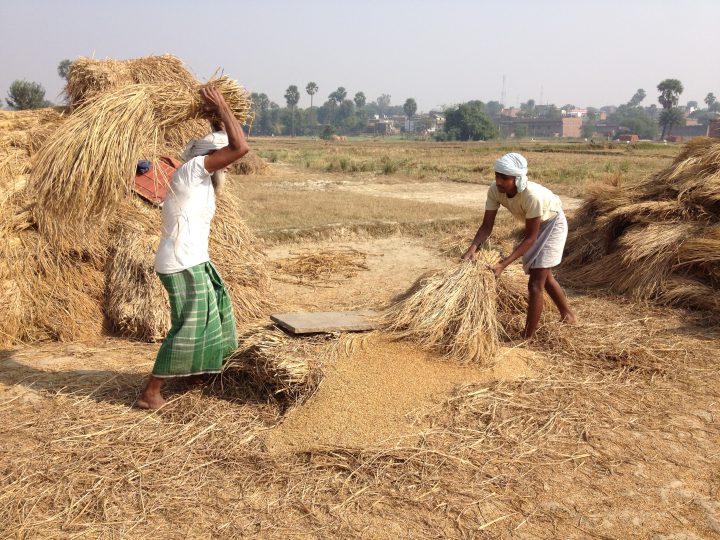 According to the FAO, each year about 1.3 billion tons of food produced for human consumption is lost after harvest and before reaching consumers. Postharvest losses not only reduce quantity but also the quality of stored grain and are amplified by changing weather patterns. Improved grain drying and storage can be key mitigators of postharvest loss, resulting in improved food availability and food safety for both smallholder farmers and end consumers.
According to the FAO, each year about 1.3 billion tons of food produced for human consumption is lost after harvest and before reaching consumers. Postharvest losses not only reduce quantity but also the quality of stored grain and are amplified by changing weather patterns. Improved grain drying and storage can be key mitigators of postharvest loss, resulting in improved food availability and food safety for both smallholder farmers and end consumers.
Can access to improved storage technology enhance food security for smallholder farmers in India? A recent study of over 1500 farmers in Bihar, India demonstrated that hermetic bags could enhance food security and raise net revenues for smallholders in the region. The study examined the impact of on-farm hermetic storage technology on four dimensions of food security – availability, access, utilization and stability. Postharvest losses during storage manifest in reduced quantity and quality of stored grain, resulting in decreased household incomes and reduced food availability.
Shahidur Rashid, Director, IFPRI South Asia said, “The post-harvest losses of major agricultural produces at the national level[1] in India is Rs. 92,651 Crore. The 2020 budget has announced an increased allocation of around 20% on food processing facilities. This is a step towards the right direction, to mitigate the post-harvest losses”.
To achieve 50% reduction in the global food loss, technological solutions for food supply chain and implementation of public policies are essential. Actions needed includes improving post-harvest infrastructure, food transport, processing and packing, increasing collaboration along the supply chain, training and equipping producers, and educating consumers (Eat-Lancet Commission Report, 2019).
Alex Winter-Nelson, Director of the ADM Institute for the Prevention of Postharvest Loss (ADMI) emphasized “there are proven technical solutions to problems of postharvest loss and food waste. An open discussion is needed to better understand why solutions have yet to be more widely adopted.”
The ADM Institute for Prevention of Postharvest Loss in collaboration with the International Food Policy Research Institute, South Asia are convening a forum of thought leaders, government actors, private-sector organizations, donors, academicians and NGOs to deliberate on the following key themes with an emphasis on the South Asia region:
- Scope and scale of the postharvest loss problem
- Evidence on the effectiveness of improved storage in enhancing food safety and food security
- Barriers to and potential unintended consequences of the adoption of improved storage systems
- Interventions to capitalize on the potential of improved storage
Along with keynotes and presentations from eminent researchers, the conference will highlight research findings from studies from India and Bangladesh. The forum seeks to share findings about the efficacy of improved technologies for on-farm and off-farm grain storage. It also seeks to draw on the experience and perspectives of diverse stakeholders to identify and promote pathways, to scale proven storage innovations into mainstream use in India and Bangladesh
About the forum: Securing the Harvest: A Forum on Improved Grain Storage for Smallholder Agriculture is taking place in Indian Council of Agricultural Research (ICAR)- Lecture Hall, NASC Complex, Pusa, New Delhi on Wednesday, February 5, 2020. For more details visit www.southasia.ifpri.info
The International Food Policy Research Institute (IFPRI) seeks sustainable solutions for ending hunger and poverty. IFPRI was established in 1975 to identify and analyze alternative national and international strategies and policies for meeting the food needs of the developing world, with particular emphasis on low-income countries and on the poorer groups in those countries visit: www.ifpri.org
The ADM Institute for the Prevention of Postharvest Loss was created in 2011 as a response to rising amounts of staple crops lost each year in food chains around the world. The institute is an international information and technology hub for evaluating, creating and disseminating economically viable technologies, practices, and systems that reduce postharvest losses of commodities, including rice, wheat, maize, and oilseeds. visit: postharvestinstitute.illinois.edu
To speak with presenters please contact Rebika Laishram, Communications Specialist, IFPRI South Asia r.laishram@cgiar.org
[1] Ministry of Food Processing Industries https://pib.gov.in/newsite/PrintRelease.aspx?relid=148566



